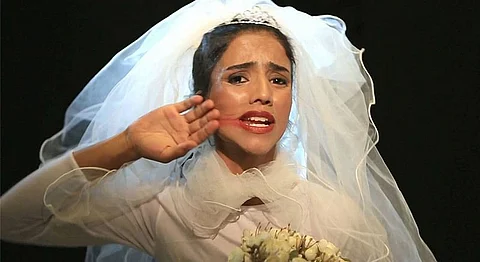
- HOMEGROWN WORLD
- #HGCREATORS
- #HGEXPLORE
- #HGVOICES
- #HGSHOP
- CAREERS
- ABOUT US
- CONTACT US

Since the fall of the Taliban regime, a generation of young Afghan women came together and began calling into question the nefarious practices and traditions of conservative Afghanistan that hundreds of women have fallen victim to in the past. At the age of 16, Sonita Alizadeh’s parents were ready to sell her as a bride to the highest bidder. This wasn’t her first encounter with the prospect of being a child bride, it began when she was only 10. At the time, she didn’t understand what it meant and thought it to be a dress-up game. She was happy with the attention she was getting from her parents and seemed glad to play along.
According to the Afghanistan Independent Human Rights Commission report, close to 15 percent of girls are married before the age of 15, and approximately 60 to 80 percent of child marriages in Afghanistan are forced. By the nation’s law, a girl cannot be married before she’s 16, 15 with her father’s consent, but the enactment of laws at the ground-level is feeble. Anyone under the age of 21 is too young for marriage, to be honest, father’s consent or not.
When she was eight, her family fled to Iran in hopes of a better life, without having to live in fear of air strikes, mortars and Taliban fighters. Unable to register for a formal education with no proper identification, Sonita learnt the basics of reading and writing while cleaning bathrooms at an NGO for Afghan refugees. She began writing poetry and listening to hip-hop; the first rapper she heard was Eminem, though she didn’t really understand what he said, she was inspired by his style; and upon hearing the works of Iranian rapper, Yas, she realised that she too could tell her story to the world through rap.
Child marriages occur for different reasons; for some, it’s purely financial, for others it’s about family alliances and a manner of repaying debts. Sonita’s brother needed $7000 to buy his bride, and her mother thought she could get $9000 for Sonita; two problems would be solved at once. “Against my brother, I have no value,” says Sonita in an interview at the Women in the World conference. She doesn’t blame or resent her mother, women in her society are taught from a young age that they hold no value as an individual, her mother grew up hearing this and was herself married off when she was 13. “She didn’t know any other way,” she continues, reiterating the cycle that keeps spinning as these beliefs are passed down from one generation to the next. “My music was a nightmare for her. Now, she is one of my biggest fans,” Sonita clarifies.
In 2014, Sonita entered and won $1000 in a competition where she wrote a song to encourage Afghan people to vote in their country’s elections. Briefly, after the competition, her mother, who had moved back to their homeland, came visiting with news of a man who was ready to pay her bride price; Sonita responded in the way that came most naturally to her, singing. A woman alone is not allowed to sing in Iran without permission from the government, still, Sonita took pen to paper, wrote and filmed ‘Brides for Sale’ with help from an Iranian filmmaker. Adorning a white veil and a painted barcode on her forehead, Sonita stands in a wedding dress contrasting a stark black background as she sings the unheard stories of a million bruised and battered girls who haven’t been as lucky as her to escape their fate. “One of my friends, she was sitting next to me, and she had bruises on her face. She was quiet and she didn’t say anything. When I looked at her, I imagine[d] that music video in my mind.”
Having uploaded the video to her Youtube page, she turned her phone off for three days fearing her mother’s reaction. Little did she know that her video would soon garner national and international attention, drawing interest of The Strongheart Group, a non-profit organisation, that reached out and offered to bring her to the U.S. Activist, writer and rapper, today Sonita lives in Utah and studies at the Wasatch Academy on a full scholarship. She wants to study further but ultimately hopes to return to Afghanistan and rap for women’s rights, she wants to encourage other young girls to take a stand against forced marriage and seek a bright future for themselves. Being an outspoken and strong-minded woman, it won’t be easy for her in a rigidly patriarchal society like Afghanistan’s, but she continues to advocate for the abolishing of child marriage and the basic rights of women. “My family, they changed their minds,” Sonita says optimistically to CNN. “If I can change their minds with my music, then maybe I can change the world.”
